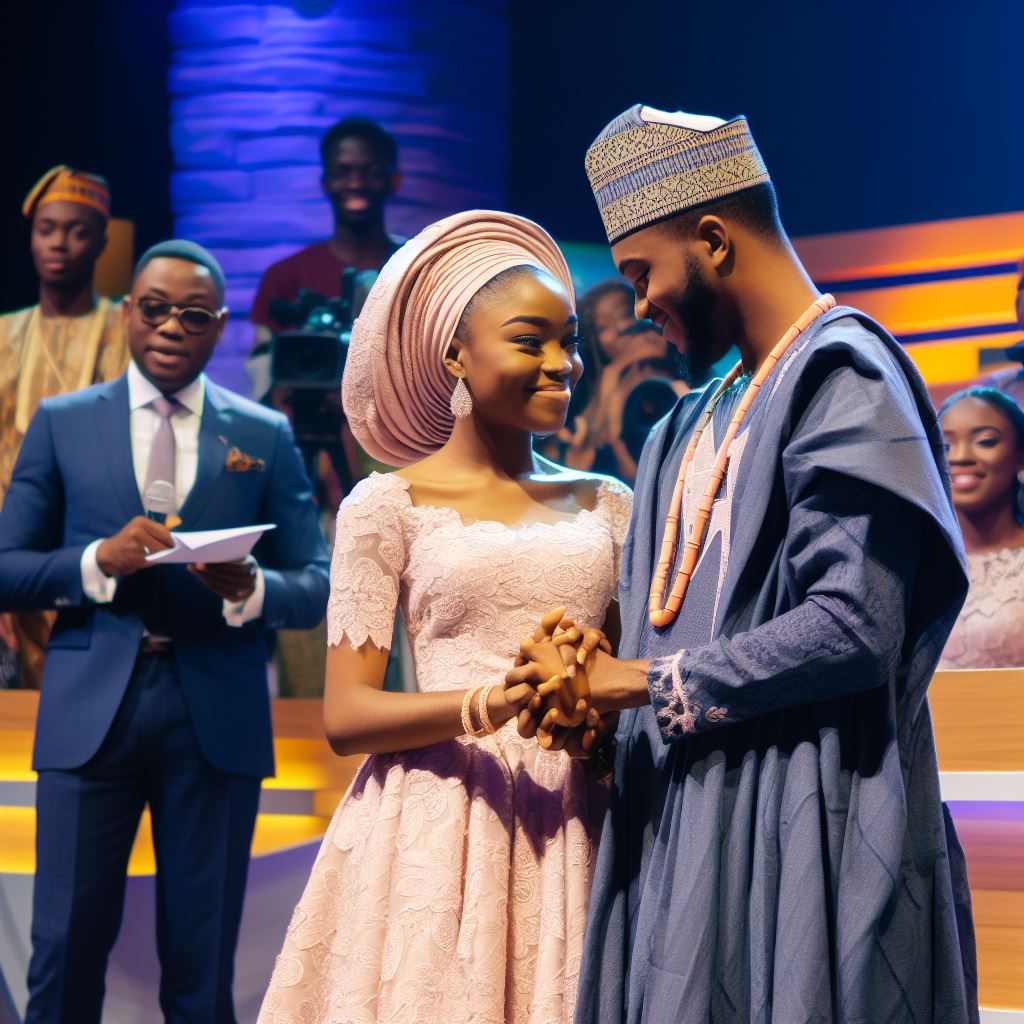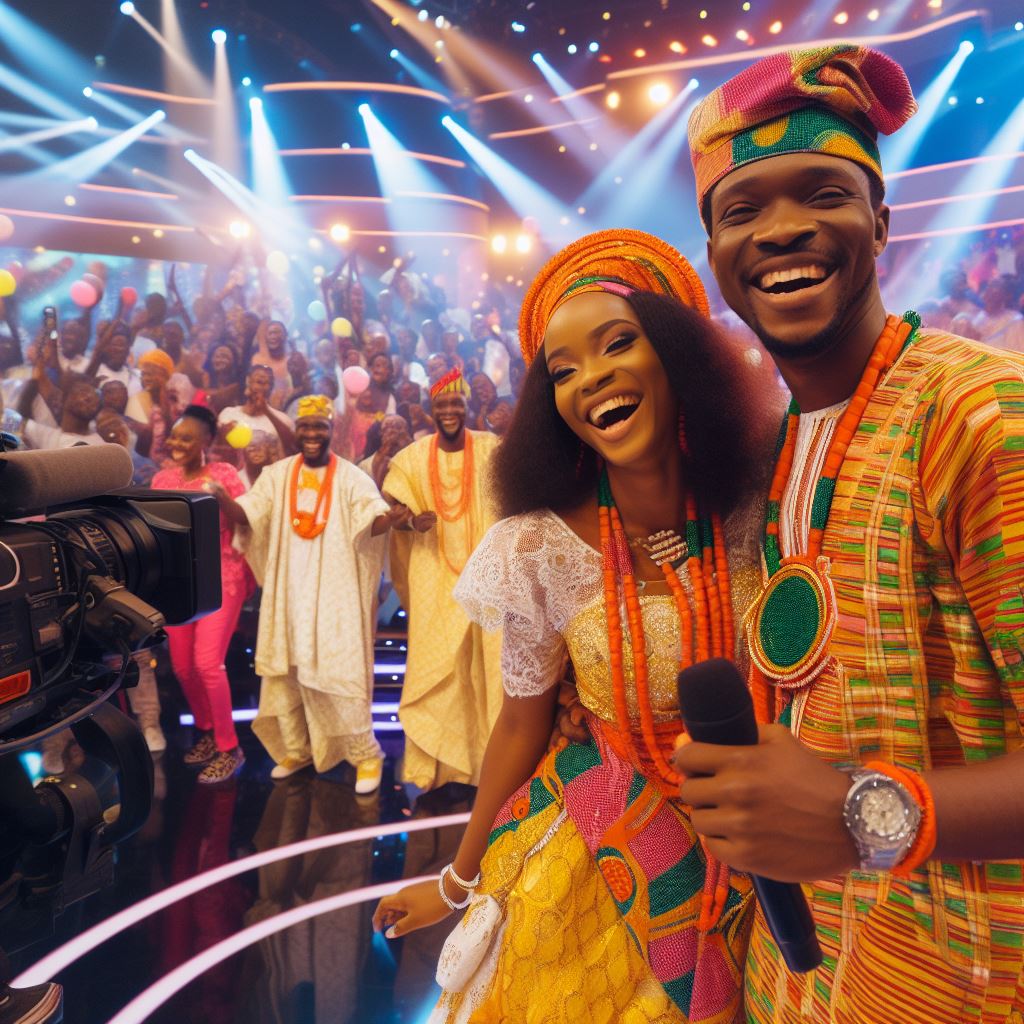Introduction
Reality TV refers to a genre of television programming that presents unscripted situations, often featuring real people rather than professional actors.
“Married at First Sight” is one such reality TV show that has gained popularity worldwide, including in Nigeria.
In Nigeria, reality TV has had a significant cultural impact, influencing societal norms and changing perspectives on marriage.
This blog post aims to explore the specific cultural impact of “Married at First Sight” in Nigeria.
By examining the cultural impact of “Married at First Sight” in Nigeria, we can gain insights into the changing perceptions of marriage and relationship dynamics in the country.
The clash with religious beliefs and values, concerns about the sanctity of marriage, ethical issues regarding the emotional toll on participants, and potential long-term effects on mental health have fueled the opposition.
Discussion of Nigerian Marriage Traditions
Brief overview of traditional marriage customs in Nigeria
Nigeria boasts diverse ethnic groups, each with unique marriage customs, including:
- Igbo: Elaborate ceremonies, kola nut sharing, and wine pouring symbolize unity.
- Yoruba: Exchange of gifts, dowries, and the ‘Mo mi mo e’ dance are prominent.
Importance of arranged marriages and family involvement
In Nigeria, arranged marriages hold substantial importance. Key aspects include:
- Parental Guidance: Elders play a pivotal role in matchmaking.
- Dowry Tradition: Grooms give dowries, often comprising livestock, cash, or other valuables.
- Extended Family: Marriages unite not just individuals but whole families.
Role of cultural values and expectations in Nigerian marriages
Nigerian marriages adhere to strong cultural values and expectations:
- Religious Significance: Faith often guides the marital journey.
- Respect for Elders: Obedience to parents and elders is fundamental.
- Gender Roles: Defined roles for spouses and family members.
- Celebrations: Festivals mark unions, a testament to cultural richness.
In light of these traditions, the advent of a show like ‘Married at First Sight’ in Nigeria raises intriguing questions about the balance between modern matchmaking and traditional values.
How do these traditional customs adapt to a modern, reality TV-driven world?
These are the critical questions to ponder as we explore the cultural impact of such shows in Nigeria.
Read: Couples of the Bible: Stories and Marriage Verses
Introduction to “Married at First Sight”
Overview of the show’s concept and format
The reality TV show “Married at First Sight” is a social experiment that explores the concept of arranged marriages.
Unlike other dating reality shows, this show takes a unique twist by skipping the traditional dating phase.
The premise of the show is to match and marry complete strangers who have never met before.
These couples then embark on a legally binding marriage and have to navigate through their relationship over a span of several weeks or months.
Brief explanation of how the show matches couples
Before the couples get married, they undergo an extensive matchmaking process.
The show’s experts, including relationship coaches, psychologists, and sociologists, carefully analyze the participants’ profiles.
Factors such as personality traits, shared values, and compatibility are considered in the selection process.
The experts aim to create matches that have the potential for a strong and lasting relationship.
Once the matches are made, the selected couples meet for the first time at their wedding ceremony.
The show’s international success and popularity
Since its inception in 2014, “Married at First Sight” has gained significant international success and popularity.
The show has been adapted in various countries, including Nigeria, Australia, the United States, and the United Kingdom.
Its unique concept has attracted a wide range of viewers who are interested in exploring unconventional relationship dynamics.
“Married at First Sight” has sparked discussions about the nature of love, arranged marriages, and the role of commitment in relationships.
Viewers are intrigued by the challenges and conflicts faced by the couples as they navigate the early stages of their marriages.
The show’s international success demonstrates society’s fascination with unconventional approaches to finding love and companionship.
Furthermore, it highlights the willingness of individuals to take risks and step outside their comfort zones in search of true love.
The show’s popularity also suggests that audiences enjoy witnessing the growth and development of relationships in real time.
People are drawn to the authenticity and vulnerability displayed by the participants on the show.
“Married at First Sight” provides a unique platform for viewers to reflect on their own relationship experiences and beliefs.
It challenges societal norms and encourages conversations about what truly matters in a successful partnership.
Basically, “Married at First Sight” is a fascinating reality TV show that combines entertainment and social experimentation.
Its concept of marrying complete strangers has captured the attention and interest of audiences worldwide.
The show’s success and popularity reflect society’s curiosity about unconventional approaches to finding love and the willingness of individuals to take risks in matters of the heart.
As viewers follow the couples’ journeys, they are able to reflect on their own relationships and beliefs, making “Married at First Sight” a thought-provoking and engaging television experience.
Read: Heartfelt Marriage Prayers and Their Bible Origins
Cultural Impact of “Married at First Sight” in Nigeria
Reality TV shows have gained immense popularity worldwide, captivating audiences with their unconventional themes and dramatic narratives.
One such show, “Married at First Sight,” has made its way to Nigeria, leaving a profound cultural impact on the society.
Let us explore the effects it has had in various aspects.
Increased interest in unconventional marriage practices
The show’s introduction to Nigeria has led to a significant shift away from traditional arranged marriages.
Young Nigerians are now more open to exploring non-traditional methods of finding love and companionship.
“Married at First Sight” has sparked a curiosity among Nigerians, encouraging them to consider alternative ways of entering into marriage.
It has prompted individuals to question the traditional norms and seek love in unconventional settings.
Influence on the perception of marriage in Nigerian society
The show has contributed to changing attitudes towards the importance of love in marriage.
It has challenged the notion that marriages solely rely on family arrangements or financial considerations. Nigerians now prioritize the emotional connection and compatibility between partners.
“Married at First Sight” has also played a significant role in reshaping traditional gender roles and expectations within marriage.
The show features strong and independent women who are willing to take charge of their own destiny, breaking stereotypes prevalent in Nigerian society.
Impact on family dynamics and parental involvement in marriage decisions
The show has empowered individuals to make their own choices when it comes to marriage.
By showcasing couples who marry based on personal preferences, “Married at First Sight” has inspired Nigerians to assert their autonomy in making important life decisions.
However, this newfound independence can sometimes lead to tensions between individual desires and family obligations.
The show’s emphasis on individual happiness may clash with the traditional Nigerian belief that marriages should also consider broader family interests and responsibilities.
Generally, “Married at First Sight” has had a profound cultural impact in Nigeria.
It has spurred interest in alternative marriage practices, challenged traditional perceptions of marriage, and influenced family dynamics.
While it has brought forth positive changes, it has also presented conflicts between individual desires and cultural expectations.
Nonetheless, the show continues to shape the discussion around marriage in Nigeria and encourages a more modern and individualistic approach to finding love and companionship.
Read: From Adam and Eve: Lessons on Marriage in the Bible

Criticisms and Controversies Surrounding the Show
Reality TV shows have always sparked controversies and debates among viewers and experts. “Married at First Sight” is no exception, especially when it comes to its cultural impact in Nigeria.
The show has faced various criticisms, particularly from religious and conservative groups.
Opposition from religious and conservative groups
1. Clashing with religious beliefs and values
One of the main reasons “Married at First Sight” has faced opposition from religious groups is due to the clash with deeply rooted religious beliefs and values.
In Nigeria, where religious traditions and practices hold significant importance, the concept of marrying a stranger without any prior courtship or family involvement is seen as a violation of religious norms.
2. Concerns about moral implications and the sanctity of marriage
Furthermore, concerns about the moral implications and the sanctity of marriage have also fueled the opposition.
Many critics argue that the show trivializes the sacred institution of marriage by treating it as a mere experiment or form of entertainment.
They fear that it promotes a culture of disposable relationships, undermining the commitment and devotion required for a successful marriage.
Ethical concerns and psychological impact on participants
1. Emotional toll on participants from public scrutiny
Apart from religious and moral concerns, ethical issues surrounding the show have also received considerable attention.
One major criticism revolves around the emotional toll it takes on the participants.
Being subjected to public scrutiny and judgment can be extremely challenging, particularly when it comes to matters as personal and intimate as marriage.
The constant pressure from cameras and the spotlight can lead to heightened stress and anxiety among the participants.
2. Potential long-term effects on mental health
There are concerns about the potential long-term effects on the mental health of the participants.
Engaging in a highly unconventional and experimental process like “Married at First Sight” can have lasting psychological consequences.
The participants may struggle with trust issues, emotional trauma, and difficulties forming genuine, lasting connections in the future.
Striking a balance between entertainment and ethical responsibility
It is crucial to address these criticisms and controversies surrounding the show in order to understand its impact on Nigerian society.
While some argue that reality TV is simply a form of entertainment that should not be taken too seriously, it is important to consider the potential consequences and implications for the individuals involved.
Striking a balance between entertainment and ethical responsibility is essential to ensure the well-being and mental health of the participants.
Essentially, “Married at First Sight” in Nigeria has faced numerous criticisms and controversies, particularly from religious and conservative groups.
The clash with religious beliefs and values, concerns about the sanctity of marriage, ethical issues regarding the emotional toll on participants, and potential long-term effects on mental health have fueled the opposition.
Understanding and addressing these concerns is essential in evaluating the cultural impact of reality TV and its implications for society.
Read: Grace, Love, and Unity: Biblical Keys for Marriage
Personal Reflections and Responses from Nigerians
Interview statements from participants and viewers of the show
- In an interview, one participant of “Married at First Sight” expressed excitement and anticipation about finding love through the show.
- Another participant mentioned that despite the unconventional method, they believed in the scientific matching process used by the experts.
- A viewer of the show shared their fascination with the concept and the potential for unexpected connections and genuine relationships.
Diverse opinions and reactions towards “Married at First Sight”
- Some Nigerians had reservations about the show, believing that it undermines the sanctity of marriage and promotes superficial relationships.
- Others appreciated the show’s premise and saw it as an opportunity for growth and self-discovery.
- There was mixed feedback about the show’s success rate, with some skeptical about long-term relationship prospects.
- A few individuals criticized the show for sensationalizing marriage and exploiting emotions for entertainment purposes.
The show’s ability to challenge societal norms and spark conversations
- “Married at First Sight” has sparked conversations about the definition of marriage, arranged marriages, and the importance of compatibility.
- This show has challenged the societal norm that emphasizes the importance of dating and courtship before marriage.
- The unconventional nature of the show has allowed for discussions on the influence of external factors on relationship success.
- The concept of entering a legally binding union with a stranger prompted discussions on trust, commitment, and the role of love in a marriage.
- Many Nigerians appreciated the way the show provided a platform for discussing relationships openly and addressing common challenges.
In general, “Married at First Sight” in Nigeria has generated a range of responses and reflections from participants and viewers.
While some individuals express excitement and trust in the process, others have reservations and concerns.
The show’s ability to challenge societal norms and facilitate meaningful conversations is evident.
It serves as a platform for discussing the complexities of relationships and marriage in modern society.
Learn More: The Importance of Honouring Commitment in Nigerian Marital Practices
Conclusion
Recap of the cultural impact of “Married at First Sight” in Nigeria
Throughout this blog post, we have explored the cultural impact of the reality TV show “Married at First Sight” in Nigeria.
We discussed how the show has challenged traditional norms and values regarding marriage, family, and relationships.
It has sparked conversations about love, commitment, and compatibility, forcing people to question long-held beliefs.
Final thoughts on the future of reality TV
The success of “Married at First Sight” in Nigeria has opened doors for more reality TV shows that delve into societal issues.
As the Nigerian audience embraces these new forms of entertainment, we can expect an even greater impact on cultural practices.
Reality TV has proven to be a powerful tool for challenging norms and fostering social change.
Closing remarks and call-to-action for further exploration and discussions
It is important to encourage further exploration and discussions around the cultural impact of reality TV, not just in Nigeria but globally.
These shows have the potential to shape societies and ignite important conversations.
Let’s continue to analyze and engage with these shows to better understand their implications and effects on our cultures.




